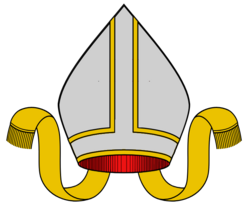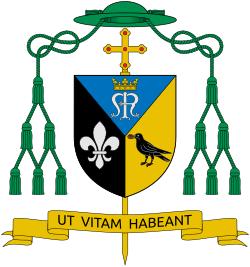This article needs additional citations for verification .(January 2011) |
Archdiocese of Nueva Segovia Archidioecesis Novae Segobiae Arkidiocesis ti Nueva Segovia Arkidiyosesis ng Nueva Segovia Arquidiócesis de Nueva Segovia | |
|---|---|
| Catholic | |
 | |
 Coat of arms | |
| Location | |
| Country | Philippines |
| Territory | Ilocos Sur |
| Ecclesiastical province | Nueva Segovia |
| Metropolitan | Nueva Segovia |
| Statistics | |
| Area | 2,579 km2 (996 sq mi) |
Population
|
|
| Parishes | 41 |
| Information | |
| Denomination | Catholic |
| Sui iuris church | Latin Church |
| Rite | Roman Rite |
| Established | August 14, 1595(Diocese) June 29, 1951(Archdiocese) |
| Cathedral | Metropolitan Cathedral of the Conversion of St. Paul the Apostle |
| Co-cathedral | Minor Basilica of Our Lady of the Assumption (temporary) |
| Patron saint | Saint Paul |
| Secular priests | 70 |
| Current leadership | |
| Pope | Leo XIV |
| Metropolitan Archbishop | Marlo Mendoza Peralta |
| Suffragans | Renato Mayugba (Laoag) Leopoldo Jaucian (Bangued) Rafael T. Cruz (Baguio) |
| Bishops emeritus | |
| Map | |
 Jurisdiction of the metropolitan see within the Philippines. | |
The Archdiocese of Nueva Segovia is an archdiocese of the Catholic Church in the Philippines. It covers the province of Ilocos Sur, on the island of Luzon. The see of the archdiocese is the city of Vigan. [2] [3]
Contents
- History
- Coat of arms
- Ordinaries
- Bishops and archbishops
- Coadjutor archbishops
- Auxiliary bishops
- Suffragan dioceses and Bishops
- Notable churches under the jurisdiction of the Archdiocese
- See also
- References
- External links
The archdiocese was erected in 1595 in the city of Nueva Segovia (modern-day Lal-lo, Cagayan). The see was moved in 1758 to Vigan because of its relative distance, at the request of Bishop Juan de la Fuente Yepes, during the pontificate of Benedict XIV. It became an archdiocese in 1951.
The archdiocese features the only archbishop's residence in the Philippines built during the Spanish era. It is located just beside the Vigan Cathedral. The rear of the convent also had an access to nearby Govantes Dike, apparently a convenient exit point by sea, but it is no longer in use as the dike is no longer navigable. Both the archbishop's residence and the cathedral itself remains to be one of the greatest contributions of the Order of Augustinian Recollects in the Philippines.
The archdiocese also operates its own radio station, dzNS ("NS" meaning "New Sound" and "Nueva Segovia"), which is a member of the Catholic Media Network.
The archdiocese also operates a weekly newspaper, Timek ti Amianan (Ilocano: "Voice of the North").














































